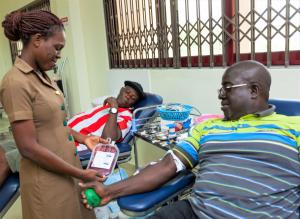The blood lines: How blood donors are saving lives in Ghana
Accra, Ghana - A ruptured liver and pulmonary embolism was the faith of Nana Serwaa Brakatuo, when she was involved in a gruesome road traffic accident in December 2022. Internal bleeding that resulted from her injuries compounded her already dire situation.
“When she was rushed into our facility, she had lost a lot of blood. We needed donor blood as a matter of urgency,” recalls Beatrice Mfoafo, a critical care nurse at the 37 Military Hospital in Accra, Ghana’s capital.
It took three weeks and two surgeries to put Nana Brakatuo on the road to recovery. But for Mfoafo, the blood transfusion that was given was the decisive ingredient in the race to save the life of Nana Brakatuo, saying “Despite our expertise, she would not have survived if we had not gotten the blood she needed. The intervention from blood donors and the National Blood Service was what did the magic for her”.
The tragic experience of Nana Brakatuo is not any different from that of 10-year old Benedict Afotey, who needed 5 units of blood to survive when he was rushed to the hospital. These cases are stuck reminders of the critical role blood donors play in saving the lives of people.
In Ghana, 179 765 blood donations were collected in 2022, with 45 463 being voluntary donations. And for these voluntary blood donors, experiences such as that of Nana Brakatuo and little Afotey continue to motivate and drive them to the national blood bank to donate.
“I believe it is our collective civic responsibility to ensure that blood is readily available for all who need it,” says Henry Nii Abossey Thompson, who has donated blood 100 times since 1976. “It is very fulfilling to give a part of you out to save the life of another person”.
The blood collection index (BCI) per 1000 population increased from 5.7 in 2021 to 5.8 in 2022. Yet, this is still below the WHO recommended minimum collection of 10 units per 1,000 population required to meet basic transfusion needs. As a result, the Ghana National Blood Service, which has been leading the charge to mobilize blood across the country, is intensifying efforts to encourage daily voluntary donations.
“As a service, we welcome new donors daily since an increasingly vibrant blood donor population will keep blood banks adequately stocked,” says Dr Shirley Owusu-Ofori, the Chief Executive Officer of the National Blood Service. “Emergencies requiring blood cannot wait; hence, we need blood ready all the time”.
The service has been working with partners such as the World Health Organization (WHO) to strengthen its capacity and advocacy towards blood sufficiency. Over the years, WHO has provided technical and financial support towards enhancing the capacity of blood transfusion staff and driving advocacy and awareness creation activities for the recruitment of unpaid voluntary blood donors to support the availability of safe blood. This is in line with the World Health Assembly resolution WHA63.12 which urges all Member States to develop national blood systems based on voluntary unpaid donations.
WHO and other partners are also supporting the National Blood Service to finalize the 4th National 5-year Strategic plan, which aligns with WHO’s recommendation for blood collection, testing, processing, storage, and distribution to be coordinated at the national level through effective organization and integrated blood supply networks.
“Supporting Ghana to make blood and other blood components available and accessible to all is a priority for WHO,” noted Dr Angela Ackon, the Technical Officer for Quality and Safety at WHO Ghana. “We are currently using our 75-anniversary activities to advocate and educate people to cultivate the culture of regular voluntary blood donations”.
Nana Serwaa Brakatuo is excited she is now on the path to total recovery and believes she is living proof that blood donors are life savers. “Words cannot express my gratitude to all blood donors,” says a happy Nana Brakatuo. “I am alive today because someone decided to voluntarily donate their blood”.
